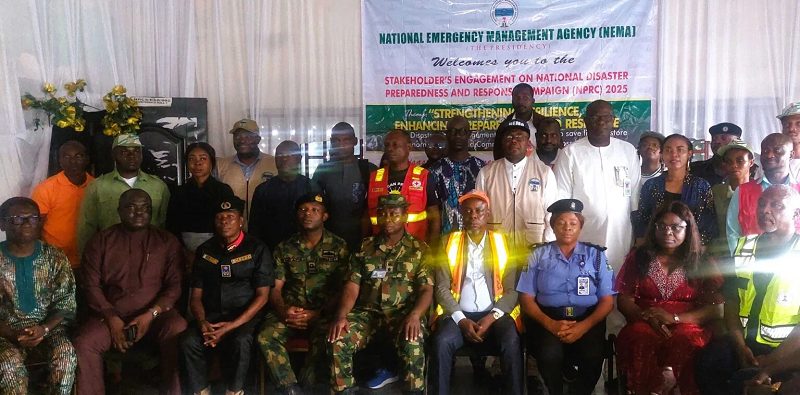The National Emergency Management Agency (NEMA) has reaffirmed its concern over the imminent risk of flooding in Rivers and 11 other states across Nigeria.

Mrs. Zubaida Umar, Director General of NEMA, raised the alarm during the launching of a multi-stakeholder engagement held on Wednesday, June 11, 2025, in Port Harcourt.
She issued the warming based on the 2025 forecast by the Nigerian Meteorological Agency (NiMeT), which predicted severe flooding in four local government areas of Rivers, including Ahoada West, Ahoada East, Andoni, and Opobo/Nkoro.
Umar, represented by Dr Godwin Tepiko, Director, NEMA South-South Zonal Directorate, explained that the forecast prompted the agency to launch its National Preparedness and Response Campaign (NPRC), aimed at mitigating the expected impact.
She emphasised that engaging with stakeholders was essential for ensuring timely and effective action to safeguard lives and livelihoods throughout the rainy season.
“The devastating impacts of annual floods in Nigeria necessitate collaboration among all tiers of government, development partners, the private sector, media and citizens to manage disaster risks and build national resilience.
“Lives, livelihoods, and infrastructure worth billions of naira have been lost to floods and related hazards in recent years.
“Nigerians have suffered injuries and lost their lives’ savings due to unmitigated flooding and associated hazards year after year,” she stated.
According to Umar, early warning systems have enabled NEMA to identify the disaster risk management implications of the forecast and develop mitigation strategies for dissemination vulnerable communities.
He noted that vulnerability maps had been produced to guide both federal, states and local authorities in implementing effective risk reduction measures.
Key disaster risk implications outlined include delayed onset of rains, earlier than normal cessation of rainfall, above-normal precipitation, and prolonged dry spells, among others.
“These factors are expected to significantly affect socio-economic sectors, including disaster management, health, agriculture, transportation, water supply, education, security, and the environment.
“To address these challenges, NEMA has implemented several proactive measures, including capacity building for local emergency responders, simulation exercise adherence to rainfall predictions for planting, irrigation, livestock vaccination, and pre-positioning of emergency supplies.
“In addition, we are also campaigning for the desilting of drainages, integrity tests on critical infrastructure, evacuation planning, and enhancing safety and security surveillance in high-risk communities,” Umar added.
She announced the deployment of field officers, in collaboration with state and local emergency agencies and volunteers, to relay early warning messages directly to flood-prone communities.
Umar appealed to residents to begin preparations in anticipation of the looming flood threat to prevent a recurrence of past unpreparedness.
She also called on traditional leaders, religious organisations, women and youth groups, and the media to support national efforts aimed at mitigating the expected disaster.
Prof. Daniel Mbee, Director of the Centre for Disaster Risk Management and Development Studies at the University of Port Harcourt (UNIPORT), praised NEMA’s proactive engagement with stakeholders.
He urged the agency to expand the scope of its consultations to involve more stakeholders.
“The inclusion of more stakeholders is critical, given the scale of the forecasted flooding, which could displace entire communities and destroy infrastructure.
“There is a need for government to treat this matter with the utmost urgency and ensure broader participation in mitigation efforts to minimise the impact of the impending disaster,” Mbee stated.
Participating organisations at the engagement included the Ministry of Health, Nigerian Army, Nigerian Navy, Police, NSCDC, FRSC, Red Cross, civil society organisations, Local Government representatives, and the vulnerable communities, among others.
By Desmond Ejibas
